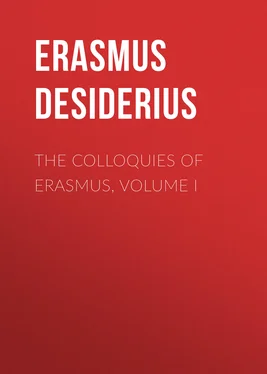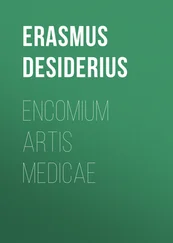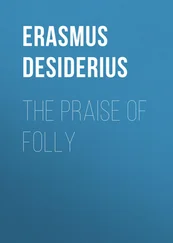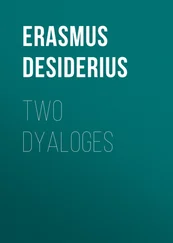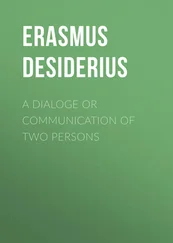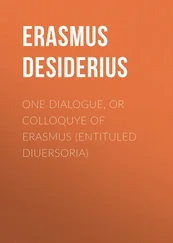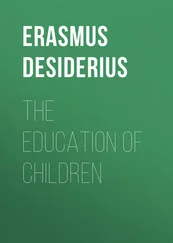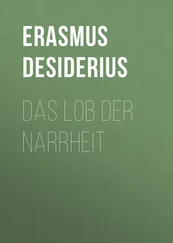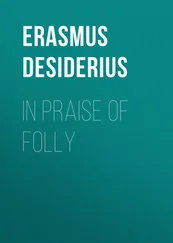Desiderius Erasmus - The Colloquies of Erasmus, Volume I
Здесь есть возможность читать онлайн «Desiderius Erasmus - The Colloquies of Erasmus, Volume I» — ознакомительный отрывок электронной книги совершенно бесплатно, а после прочтения отрывка купить полную версию. В некоторых случаях можно слушать аудио, скачать через торрент в формате fb2 и присутствует краткое содержание. Жанр: foreign_prose, foreign_antique, на английском языке. Описание произведения, (предисловие) а так же отзывы посетителей доступны на портале библиотеки ЛибКат.
- Название:The Colloquies of Erasmus, Volume I
- Автор:
- Жанр:
- Год:неизвестен
- ISBN:нет данных
- Рейтинг книги:5 / 5. Голосов: 1
-
Избранное:Добавить в избранное
- Отзывы:
-
Ваша оценка:
- 100
- 1
- 2
- 3
- 4
- 5
The Colloquies of Erasmus, Volume I: краткое содержание, описание и аннотация
Предлагаем к чтению аннотацию, описание, краткое содержание или предисловие (зависит от того, что написал сам автор книги «The Colloquies of Erasmus, Volume I»). Если вы не нашли необходимую информацию о книге — напишите в комментариях, мы постараемся отыскать её.
The Colloquies of Erasmus, Volume I — читать онлайн ознакомительный отрывок
Ниже представлен текст книги, разбитый по страницам. Система сохранения места последней прочитанной страницы, позволяет с удобством читать онлайн бесплатно книгу «The Colloquies of Erasmus, Volume I», без необходимости каждый раз заново искать на чём Вы остановились. Поставьте закладку, и сможете в любой момент перейти на страницу, на которой закончили чтение.
Интервал:
Закладка:
And to crown the Whole, he did not spare that beloved Principle and Custom of the Papists, so zealously practis'd by them upon Protestants, viz. the Persecution and Burning of Hereticks.
And now, of how much Use and Advantage such Things, and from such a Person as_ Erasmus, may be, and how much they may conduce to the extirpating those Seeds of Popery, that may have been unhappily sown, or may be subtilly instill'd into the Minds of uncautious Persons, under the specious Shew of Sanctity, will, I presume, easily appear. Tho' the Things before-mention'd may be Reason sufficient for the turning these Colloquies of Erasmus into English, that so useful a Treatise may not be a Book seal'd, either to Persons not at all, or not enough acquainted with the Latin tongue, as to read them with Edification; yet I did it from another Motive, i.e. the Benefit of such as having been initiated, desire a more familiar Acquaintance with the Latin Tongue (as to the Speaking Part especially, to which Erasmus's Colloquies are excellently adapted) that by comparing this Version with the Original, they may be thereby assisted, to more perfectly understand, and familiarize themselves with those Beauties of the Latin Language, in which Erasmus _in these Colloquies abounds.
And for that End, I have labour'd to give such a Translation of them, as might in the general, be capable of being compar'd with the Original, endeavouring to avoid running into a Paraphrase: But keeping as close to the Original as I could, without Latinizing and deviating from the_ English Idiom, and so depriving the English Reader of that Pleasure, that Erasmus so plentifully entertains his Reader with in Latin.
It is true, Sir Roger l'Estrange and Mr. Tho. Brown, have formerly done some select Colloquies, and Mr. H.M. many years since has translated the whole; but the former being rather Paraphrases than Translations, are not so capable of affording the Assistance before-mention'd; and as to the latter, besides that his Version is grown very scarce, the Style is not only antient, but too flat for so pleasant and facetious an Author as Erasmus is .
I do not pretend to have come up in my English, to that Life and Beauty of Erasmus in Latin, which as it is often inimitable in the English Language, so it is also a Task fit to be undertaken by none but an English Erasmus himself , i.e. one that had the same Felicity of Expression that he had; but I hope it will appear that I have kept my Author still in my Eye, tho' I have followed him passibus haud æquis, and could seldom come up to him. I shall not detain you any longer; but subscribe my self, yours to serve you ,
Jan. 25th , N. BAILEY. 1724-5.THE LIFE OF ERASMUS
DESIDERIUS Erasmus , surnamed Roterodamus , was born at Roterdam , a Town of Holland , on the Vigil of Simon and Jude , or October the 20th or 28th, 1465, according to his Epitaph at Basil ; or according to the Account of his life, Erasmo Auctore, circa annum, &c. about the Year 1467, which agrees with the Inscription of his Statue at Roterdam , which being the Place of his Nativity, may be suppos'd to be the most authentick. His Mother's Name was Margaret , the Daughter of one Peter , a Physician of Sevenbergen . His Father's Name was Gerard , who carried on a private Correspondence with her, upon Promise of Marriage; and as it should seem from the Life which has Erasmus's Name before it, was actually contracted to her, which seems plainly to be insinuated by these Words; Sunt qui intercessisse verba ferunt : However, it is not to be denied that Erasmus was born out of Wedlock, and on that Account, Father Theophilus Ragnaud , has this pleasant Passage concerning him: If one may be allow'd to droll upon a Man, that droll'd upon all the World , Erasmus, tho' he was not the Son of a King, yet he was the Son of a crown'd Head , meaning a Priest. But in this he appears to have been mistaken, in that his Father was not in Orders when he begat him. His Father Gerard was the Son of one Elias , by his Mother Catherine , who both liv'd to a very advanc'd Age; Catherine living to the Age of 95. Gerard had nine Brethren by the same Father and Mother, without one Sister coming between them; he himself was the youngest of the ten, and liv'd to see two of his Brothers at Dort in Holland , near 90 Years of Age each. All his Brothers were married but himself; and according to the Superstition of those Times, the old People had a mind to consecrate him to God, being a tenth Child, and his Brothers lik'd the Motion well enough, because by that Means they thought they should have a sure Friend, where they might eat and drink, and be merry upon Occasion. They being all very pressing upon him to turn Ecclesiastick, (which was a Course of Life that he had no Inclination to,) Gerard finding himself beset on all Sides, and by their universal Consent excluded from Matrimony, resolving not to be prevail'd upon by any Importunities, as desperate Persons do, fled from them, and left a Letter for his Parents and Brothers upon the Road, acquainting them with the Reason of his Elopement, bidding them an eternal Farewell, telling them he would never see them more. He prosecuted his Journey to Rome , leaving Margaret , his Spouse that was to be, big with Child of Erasmus. Gerard being arriv'd at Rome , betook himself to get his Living by his Pen, (by transcribing Books) being an excellent Penman; and there being at that Time a great deal of that Sort of Business to do (for as the Life that is said to be Erasmo Auctore has it, tum nondum ars typographorum erat , i.e. The Art of Printing was not then found out ; which was a Mistake, for it had been found out twenty-four Years before, in the Year 1442. But perhaps the Meaning may be, tho' it was found out, it was not then commonly used) he got Money plentifully, and for some Time, as young Fellows us'd to do, liv'd at large; but afterwards apply'd himself in good Earnest to his Studies, made a considerable Progress in the Latin and Greek Tongues, which was very much facilitated by his Employment of transcribing Authors, which could not but strongly impress them on his Memory; and he had also another great Advantage, in that a great many learned Men then flourish'd at Rome and he heard particularly one Guarinus . But to return to Erasmus , his Mother Margaret being delivered of him, he was after his Father called Gerard , which in the German Tongue, signifies Amiable ; and as it was the Custom among learned Men in those Times, (who affected to give their Names either in Latin or Greek ,) it was turn'd into Desiderius ( Didier ) in Latin , and into Erasmus [Greek: Herasmios] in Greek , which has the same Signification. He was at first brought up by his Grandmother, till Gerard's Parents coming to the Knowledge that he was at Rome , wrote to him, sending him Word, that the young Gentlewoman whom he courted for a Wife was dead; which he giving Credit to, in a melancholy Fit, took Orders, being made a Presbyter, and apply'd his Mind seriously to the Study of Religion. But upon his Return into his own Country, he found that they had impos'd upon him. Having taken Orders, it was too late to think of Marriage; he therefore quitted all further Pretensions to her, nor would she after this, be induced to marry. Gerard took Care to have his Son Erasmus liberally educated, and put him to School when he was scarce four Years old. (They have in Holland , an ill-grounded Tradition; that Erasmus , when he was young, was a dull Boy, and slow at Learning; but Monsieur Bayle has sufficiently refuted that Error, tho' were it true, it were no more Dishonour to him, than it was to Thomas Aquinas, Suarez , and others.) He was a Chorister at Utrecht , till he was nine Years old, and afterwards was sent to Daventer , his Mother also going thither to take Care of him. That School was but barbarous, the most that was minded, was Matins , Even-Song, &c. till Alexander Hegius of Westphalia , and Zinthius , began to introduce something of better Literature. (This Alexander Hegius , was an intimate Friend to the learned Rodolphus Agricola , who was the first that brought the Greek Tongue over the Mountains of Germany , and was newly returned out of Italy , having learned the Greek Tongue of him.) Erasmus took his first Taste of solid Learning from some of his Playfellows, who being older than himself, were under the Instruction of Zinthius : And afterwards he sometimes heard Hegius ; but that was only upon holy Days, on which he read publickly, and so rose to be in the third Class, and made a very good Proficiency: He is said to have had so happy a Memory, as to be able to repeat all Terence and Horace by Heart. The Plague at that Time raging violently at Daventer , carry'd off his Mother, when Erasmus was about thirteen Years of Age; which Contagion increasing more and more every Day, having swept away the whole Family where he boarded, he returned Home. His Father Gerard hearing of the Death of his Wife, was so concern'd at it, that he grew melancholy upon it, fell sick, and died soon after, neither of them being much above forty Years of Age. He assign'd to his Son Erasmus three Guardians, whom he esteem'd as trusty Friends, the Principal of whom was Peter Winkel , the Schoolmaster of Goude . The Substance that he left for his Education, had been sufficient for that Purpose, if his Guardians had discharg'd their Trust faithfully. By them he was remov'd to Boisleduc , tho' he was at that Time fit to have gone to the University. But the Trustees were against sending him to the University, because they had design'd him for a Monastick Life. Here he liv'd (or, as he himself says, rather lost three Years) in a Franciscan Convent, where one Rombold taught Humanity, who was exceedingly taken with the pregnant Parts of the Youth, and began to sollicit him to take the Habit upon him, and become one of their Order. Erasmus excused himself, alledging the Rawness and Unexperiencedness of his Age. The Plague spreading in these Parts, and after he had struggled a whole Year with an Ague, he went Home to his Guardians, having by this Time furnished himself with an indifferent good Style, by daily reading the best Authors. One of his Guardians was carried off by the Plague; the other two not having manag'd his Fortune with the greatest Care, began to contrive how they might fix him in some Monastery. Erasmus still languishing under this Indisposition, tho' he had no Aversion to the Severities of a pious Life, yet he had an Aversion for a Monastery, and therefore desired Time to consider of the Matter. In the mean Time his Guardians employ'd Persons to sollicit him, by fair Speeches, and the Menaces of what he must expect, if he did not comply, to bring him over. In this Interim they found out a Place for him in Sion , a College of Canons Regulars near Delft , which was the principal House belonging to that Chapter. When the Day came that Erasmus was to give his final Answer, he fairly told them, he neither knew what the World was, nor what a Monastery was, nor yet, what himself was, and that he thought it more advisable for him to pass a few Years more at School, till he came to know himself better. Peter Winkel perceiving that he was unmoveable in this Resolution, fell into a Rage, telling him, he had taken a great deal of Pains to a fine Purpose indeed, who had by earnest Sollicitations, provided a good Preferment for an obstinate Boy, that did not understand his own Interest: And having given him some hard Words, told him, that from that Time he threw up his Guardianship, and now he might look to himself. Erasmus presently reply'd, that he took him at his first Word; that he was now of that Age, that he thought himself capable of taking Care of himself. When his Guardian saw that threatening would not do any Thing with him, he set his Brother Guardian, who was his Tutor, to see what he could do with him: Thus was Erasmus surrounded by them and their Agents on all Hands. He had also a Companion that was treacherous to him, and his old Companion his Ague stuck close to him; but all these would not make a monastick Life go down with him; till at last, by meer Accident, he went to pay a Visit at a Monastery of the same Order at Emaus or Steyn near Goude , where he found one Cornelius , who had been his Chamber-fellow at Daventer . He had not yet taken the Habit, but had travelled to Italy , and came back without making any great Improvements in Learning. This Cornelius , with all the Eloquence he was Master of, was continually setting out the Advantages of a religious Life, the Conveniency of noble Libraries, Retirement from the Hurry of the World, and heavenly Company, and the like. Some intic'd him on one Hand, others urg'd him on the other, his Ague stuck close to him, so that at last he was induc'd to pitch upon this Convent. And after his Admission he was fed up with great Promises to engage him to take upon him the holy Cloth. Altho' he was but young, he soon perceived how vastly short all Things there fell of answering his Expectations; however, he set the whole Brotherhood to applying their Minds to Study. Before he professed himself he would have quitted the Monastery; but his own Modesty, the ill Usage he was treated with, and the Necessities of his Circumstances, overcame him, so that he did profess himself. Not long after this, by the means of Gulielmus Hermannus of Buda , his intimate Associate, he had the Honour to be known to Henry a Bergis Bishop of Cambray , who was then in Hopes of obtaining a Cardinal's Hat, which he had obtained, had not Money been wanting: In order to sollicit this Affair for him, he had Occasion for one that was Master of the Latin Tongue; therefore being recommended by the Bishop of Utrecht , he was sent for by him; he had also the Recommendation of the Prior , and General, and was entertained in the Bishop's Family, but still wore the Habit of his Order: But the Bishop, disappointed in his Hope of wearing the Cardinal's Hat, Erasmus finding his Patron fickle and wavering in his Affections, prevail'd with him to send him to Paris , to prosecute his Studies there. He did so, and promised him a yearly Allowance, but it was never paid him, according to the Custom of great Men. He was admitted of Montague College there, but by Reason of ill Diet and a damp Chamber, he contracted an Indisposition of Body, upon which he return'd to the Bishop, who entertain'd him again courteously and honourably: Having recover'd his Health, he return'd into Holland , with a Design to settle there; but being again invited, he went back to Paris . But having no Patron to support him, he rather made a Shift to live (to use his own Expression) than to study there; and undertook the Tuition of an English Gentleman's two Sons. And the Plague returning there periodically for many Years, he was obliged every Year to return into his own Country. At length it raging all the Year long, he retir'd to Louvain .
Читать дальшеИнтервал:
Закладка:
Похожие книги на «The Colloquies of Erasmus, Volume I»
Представляем Вашему вниманию похожие книги на «The Colloquies of Erasmus, Volume I» списком для выбора. Мы отобрали схожую по названию и смыслу литературу в надежде предоставить читателям больше вариантов отыскать новые, интересные, ещё непрочитанные произведения.
Обсуждение, отзывы о книге «The Colloquies of Erasmus, Volume I» и просто собственные мнения читателей. Оставьте ваши комментарии, напишите, что Вы думаете о произведении, его смысле или главных героях. Укажите что конкретно понравилось, а что нет, и почему Вы так считаете.
